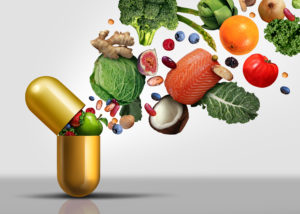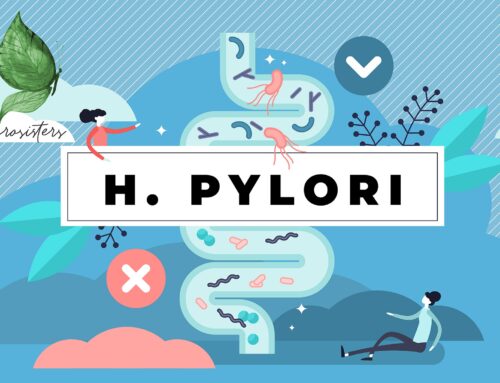Take a bite out of autoimmune disease and Hashimoto’s …with breakfast, lunch and dinner!
 What is and isn’t on your plate could dramatically affect your thyroid function. All it takes is knowing what foods to avoid and foods to eat with Hashimoto’s.
What is and isn’t on your plate could dramatically affect your thyroid function. All it takes is knowing what foods to avoid and foods to eat with Hashimoto’s.
Could YOUR thyroid symptoms disappear with a menu change? You may be surprised to find thyroid symptoms and antibodies reduced (or completely out of the picture).
Consider this the ultimate eating guide for autoimmune thyroid. Take note of these best and worst foods for Hashimoto’s next time you head to the grocery store or out for dinner.
Some Foods Can Negatively Affect Hashimoto’s
The truth can be hard to swallow. But, what you eat not only affects how you feel, it also affects your immune system.
We’re not just talking fast food and donuts here. Even seemingly healthy foods could be contributing to your Hashimoto’s. An elimination diet or food sensitivity testing can be helpful for determining individual food sensitivities.
Still, there are key foods that are common problems for anyone with Hashimoto’s.
Worst Foods for Hashimoto’s
These are foods that might be making Hashimoto’s worse:
- Gluten
- Sugar
- Soy
- Dairy
- Grains
- Alcohol, especially from non-organic sources
Also, depending on a person’s unique response to foods, nightshades may need to be avoided, too.
Why avoid these specific foods? They can contribute to poor gut health and are known for triggering an immune response in many people.
How the Immune System Responds to Food
There are a couple of ways the immune system responds to food–mainly, food allergies and food sensitivities.
You’re probably pretty aware of the effects of food allergies. Jane eats shellfish. Jane’s face blows up like a balloon and goes to the ER.
Breathing difficulties, hives, and swelling are common. These IgE reactions are immediate and involve a particular part of the immune system in their reaction.
However, there are other branches of the immune system that also cause different, delayed food reactions. Known as food sensitivities, these can occur up to 3 days after eating a problematic food. (Which is pretty problematic when trying to pinpoint problems because, who remembers what they ate three days ago?!)
Food sensitivities can include symptoms such as:
- Headaches and migraines
- Achy joints and muscles
- Brain fog and fatigue
- Irritability, anxiety and depression
- GI symptoms such as gas and bloating
While food sensitivities can vary from person to person, there are some foods that are known to have a big effect on the GI tract in everyone.
Let’s take a closer look at the effects of these foods to avoid for Hashimoto’s and autoimmunity.
1. Avoid Gluten with Hashimoto’s
What gluten does to your gut
Gluten is dynamite for your gut. It sends off a chemical messenger called zonulin that lets tight junctions open in the gut. Poor gut health is one of the conditions that must be present for Hashimoto’s or any autoimmune disease to develop.
Going gluten-free can lower inflammation. It may also increase the amount of nutrients absorbed.
You don’t need to have celiac disease to benefit from ditching gluten
A 2016 study involving participants with Hashimoto’s but without celiac disease were put on a gluten-free, lower carbohydrate diet. Guess what happened? Antibodies decreased in all of the participants who followed this diet…in only 21 days!
A 2019 study also found Hashimoto’s antibodies decreasing when gluten was avoided.
Researchers suggested those with Hashimoto’s also be screened for celiac after a different study looked at the relationship between Hashimoto’s and celiac disease.
How eating gluten affects thyroid function
Gluten sensitivity can lead to a selenium deficiency. Selenium is needed to produce the thryoid’s active hormone, T3.
Also, gluten could be the reason someone develop Hashimoto’s in the first place. Gut permeability leads to antibodies. Antibodies are sometimes mistakenly made against the body’s own tissue, such as the thyroid.
As an added bonus, going gluten-free could mean the end of acid reflux, constipation or stubborn weight loss.
Gluten is in wheat, oats, white flour, barley and rye
Wheat is the biggest contributor to gluten-containing foods in the Western diet. When avoiding gluten, you’ll need to avoid barley and rye.
These gluten-containing grains can be found in:
- Bread
- Cereals
- Caramel coloring, flavoring
- Couscous
- Crackers
- Bread
- Baked goods
- Beer
- Malt (syrup, vinegar, etc.)
- Pasta
- Soups
- Brewer’s yeast
- Soba noodles
- Spice blends
- Soy sauce
- Some chicken and beef broths
- Some gravies, sauces, glazes, condiments and salad dressings
- Whiskey
Are organic sources of gluten okay?
Even if the gluten is coming from an organic source, the negative effects on your thyroid and gut are the same. Other forms of wheat such as spelt, farro, seitan, bulgur and triticale need to be avoided, too.
Watch out for hidden gluten
Look for hidden offenders. Gluten can lurke in tea bags, chewing gum, smoke flavoring, dried fruit, and any label of “natural flavoring” could be suspect.
Non-food sources of gluten
Lotions, soaps, postage stamps, toothpastes, hair products and children’s play dough can contain gluten that is absorbed through the skin.
2. Avoid Sugar with Hashimoto’s
One reason to stay away from the sugar bowl when it comes to the worst foods for Hashimoto’s has to do with your gut. Avoiding sugar can mean helping heal a leaky gut. This is good news for decreasing antibodies.
Avoiding sugar can mean staying away from yeast overgrowth like Candida.
A diet high in good fats such as a ketogenic approach can help repair the digestive tract and decrease inflammatory markers.
3. Avoid Soy with Hashimoto’s
Soy is another no-no when it comes to foods that support your thyroid with Hashimoto’s. The problem? Goitrogens. Other cruciferous veggies like broccoli and cauliflower contain goitrogens, too; however, soy contains goitrogens even after cooking. If you’ve ever noticed yourself super-tired after eating soy, this could be why.
Other reasons to pass up the soy? It’s one of the most genetically modified crops. For women, soy can contribute to estrogen dominance since soy contains phytoestrogens.
Just can’t say no to soy? Your safest bet is fermented varieties like tempeh and miso eaten here and there.
“But I never eat soy!” Just be aware that any type of packaged, processed food has a very high potential for containing soy. Check labels for the use of the word soy along with phrases such as hydrolyzed vegetable protein or texturized vegetable protein. Maybe just double-check that ingredient list before buying your next energy bar.
4. Avoid Dairy with Hashimoto’s
Why should you think twice about how you answer the “got milk?” question, especially in light of Hashimoto’s? Cowabunga, there’s a quite a few. And it’s not just the lactose, either, so taking enzymes to break down those specific sugars aren’t the solution you’re looking for.
If you’ve got a leaky gut, those little milk proteins that might be a-okay for a baby cow can signal danger once escaped into your bloodstream. Next step? Antibodies and autoimmunity. Other problems with dairy include IgG or IgA food reactions—two different ways your immune system can respond to dairy.
Making the switch to dairy-free
You’ll want to do a clean sweep of the fridge when eliminating dairy. Items to avoid include butter, cheese, cow’s milk, whey and yogurt.
When looking for substitutes, consider plant-based milks and yogurts such as almond or coconut products.
Some people do fine with a kefir since it doesn’t can’t the problematic casein proteins. Ghee, basically just butter fat, may work well, too. In some cases, organic goat products can be used without irritation.
5. Avoid Grains, Beans and with Hashimoto’s
A grain-free diet is very similar to a standard gluten-free approach except here all grains are avoided including:
- Amaranth
- Barley
- Bulgur
- Corn
- Couscous
- Kamut
- Millet
- Oats
- Wheat
- Wheat germ
“Why the grain-hate?!” some plead. “Don’t they provide needed fiber?!”
While, yes, grains are a source of fiber, they also bring with them a hefty amount of pesticides and a built-in defense system that can cause havoc on your gut.
Grains are often a source of potentially hypothyroid-contributing mycotoxins due to their storage.
Plant proteins found in gluten-free grains, beans and legumes can promote gluten cross-reactivity. Meaning: it’s not gluten, but your body might react to it as if it were just because of the similarity in makeup.
6. Avoid Alcohol with Hashimoto’s
“But I thought that wine was good for my heart?!” Sure, no one will deny that there’s evidence that alcohol, especially wine, may have some benefits, it is worth noting the link to Hashimoto’s.
Alcohol increases leaky gut, thus promotes autoimmunity and increases the risk of thyroid antibody creation.
7. Avoid Nightshades with Hashimoto’s
While everyone wants to stay away from the deadly nightshade atropa belladonna, there could be reason to steer clear of other plants in the nightshade family. Inflammation can be caused by the lectin, saponin and capsaicin components in nightshade fruits and vegetables.
Nightshades include tomatoes, potatoes, peppers, goji berries and eggplant. Cayenne, paprika and some spice blends such as chilli powder contain nightshades, as well.
Making the switch to a diet without nightshades
Swap regular potatoes with sweet potatoes. Look for AIP Paleo recipes for homemade salsa, tomato sauce, taco seasoning, bbq and ketchup. These sub off the beaten path veggies to make nightshade-free culinary staples.
Eat These Thyroid and Immune-Supporting Foods
The foods that you do include on your Hashimoto’s healing food template are just as important as the foods you pass up. Key nutrients in the foods you consume can make your thyroid gland work better, thus giving you a little relief from plaguing symptoms.
Eat Foods with Selenium
Got selenium? If not, your thyroid performance could be hurting.
Selenium is a trace mineral with a thyroid superpower. It is needed in order for your body to convert T4 to T3, the active form of thyroid hormone.
Selenium has another important job. It is a buffer against hydrogen peroxide produced when iodine is converted in your thyroid. Since hydrogen peroxide can lead to an autoimmune response, selenium should be on your plate.
In a study, those with Hashimoto’s and low selenium levels reduced their thyroid antibody levels by over 60% by bumping up their daily intake to 200 mcg.
Dietary sources of selenium
These foods contain higher levels of selenium:
-
- Oysters: 130 mcg in 3 oz
- Shrimp: 32 mcg in 3 oz
- Beef skirt steak: 60 mcg in 6 oz
- Chicken breast: 54 mcg in 6 oz
Also, brazil nuts and sunflower seeds contain selenium. However, note that nuts and seeds may be a trigger food for you, as well. Some people may need to avoid these for a time or all together.
Eat Foods with Zinc
Zinc is needed for thyroid hormone conversion and to produce TSH. If you follow a vegan or vegetarian diet, you may be more prone to a zinc deficiency. Legumes and grains have higher amounts of phytates. This chemical blocks the ability of zinc to work properly and affects hormones.
Dietary sources of zinc
Check out these foods with zinc:
- Red meat
- Chicken
- Spinach
- Kefir
- Dark chocolate
- Pumpkin
- Eggs
Eat Foods with B Vitamins
You’ll want to be sure to get your B vitamins for thyroid health. You’ll want to pay attention to B12, B9 and B6.
B12 and Thyroid Function
A study found a high occurrence of vitamin B12 deficiency with hypothyroidism and Hashimoto’s.
Sources of B12 include beef, nutritional yeast, salmon, eggs and sardines.
B9 (Folate) and Thyroid Function
Poor methylation can affect thyroid function, so it’s important to opt for foods with folate. Leafy greens, eggs, asparagus, beets, broccoli, avocados and brussel sprouts are sources of folate. Skip supplements with “folic acid” since these can be problematic for those with a MTHFR gene mutation.
B6 and Thyroid Function
Vitamin B6 works with iodine to make thyroid hormone. It influences mood, liver detoxification and energy levels. If you’re supplementing with B1, it might interfere with your B6 levels.
Food sources of B6 include:
- Chicken, turkey, beef, salmon, tuna
- Spinach
- Sweet potato
- Avocado
- Winter squash
Eat Foods with Omega 3’s
Omega 3’s, like those found in salmon, fight inflammation and can actually help thyroid hormones get in to your cells. A study found getting plenty of omega 3 resulted in less anti-inflammatory medication.
Sources of long-chain omega 3 fatty acids include wild caught salmon, grass-fed beef and a quality fish oil supplement.
Eat Foods with Iron
Adequate iron consumption can prevent the formation of reverse T3. Not getting enough iron can mean not making enough T4 or T3.
Be Empowered in your Hashimoto’s Healing Journey
Now you know what foods to eat and what to avoid for Hashimoto’s. Go ahead and pat yourself on the back! You’re taking control of your health and finding concrete ways to manage your Hashimoto’s.
Empowering you on your health journey is our purpose at ThyroSisters. Our heart’s cry is to see you feeling 100 percent like you again.
That’s the goal of our programs. You don’t have to feel like you’re all alone in the desert of thyroid dysfunction. Access our friendly, client coordinators with your questions and thoughts. We thank you and applaud you as you investigate your next steps in healing.





